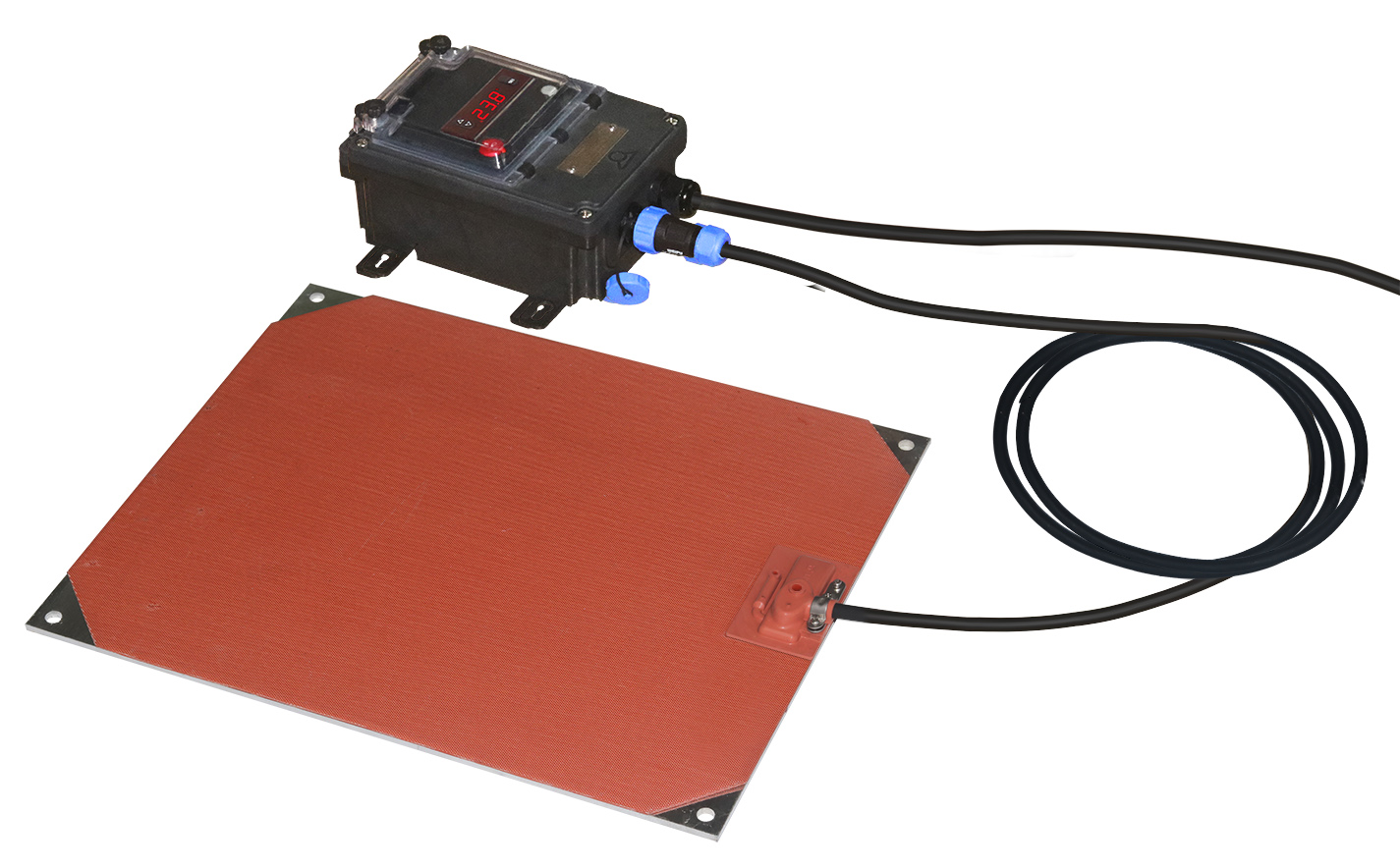

- Air and Fluid heating solutions
- Renewable energy
- Industry
- Ventilation
- Petrochemistry
Main features
Non-flexible silicone rubber heaters are made of fiberglass reinforced laminated silicone rubber sheets, vulcanized together through heat and high pressure on both sides of an embedded specially formed heating wire element. Fiberglass-reinforced silicone rubber gives the heater dimensional stability.
The intimate bonding of the heater on a thick aluminum plate allows to increases the power surface load, and eases the mounting on flat surfaces in industrial applications
Silicone is used because of its high temperature resistance (Permanent temperature up to 200°C (390°F), high thermal conductivity (~7 10-4 W/cm.K) and good electrical insulation properties (~12KV/mm)
This series is distinguished by the use of a remote electronic control system, on-off action, simple to use, with digital display of the measured value, connection by waterproof connector for easy disconnection of the heater, and IP65 ingress protection class for the whole assembly. This allows its use in most of industrial applications
Other general particularities of these heaters are:
- Not affected by vibration or flexing,
- Lightweight,
- Comply with UL94-VO (flame retardant) and ROHS,
- Low smoke and low Toxicity,
- Silicone is non-toxic, and moisture and chemical resistant
Main applications
Silicone heating elements on aluminum plates are a simple and industrial solution for heating flat surfaces. They are sturdy, easy to install and heat quickly and evenly.
Some typical examples of applications are: Heating of hoppers, electrical cabinets, hot plates for the food industry, reheating tank bottoms.
In addition to their temperature control system, they can receive temperature sensors, temperature limiters, thermal fuses.
Technical features Mounting: By 4 holes dia. 12mm located at the 4 corners, at 15mm from edges Length (Dimension A): Upon customer request (minimum 300mm)
Width (dimension B): Upon customer request (minimum 100mm)
Ingress protection: IP65.
Minimum ambient temperature: -10o C (+15o F)
Voltage: 220-240VAC.
Power tolerance: ±10% at 20°C
Temperature control:
By electronic controller with digital display, On-Off action, set point adjustment range up to 120°C (NTC sensor), or 200°C (Pt100 sensor), relay output, located in an independent waterproof housing, designed for wall mounting. It is connected to the flexible silicone rubber heater by a cable equipped with a 5-pin waterproof quick connector, facilitating the connection and disconnection with the heater. It controls the temperature by means of a probe placed under a silicone boot on the outer surface of the heater.
Maximum rating 16A 230V (3600W).
Power density:
- 0.2 w/cm2 (1.3W/in²) for plastic materials
- 0.75 w/cm2 (4.8 w/inch2), for usual applications.
- 1 w/cm² (6.5 w/inch2) for fast heating applications.
- 1.4 w/cm² (9.1 w/inch2) for huge power applications
Other values on request.
Thickness of the flexible silicone foil: 2.5mm
Thickness of the aluminum board: 6 mm (other values on request).
Quality control routine tests: Each element is 100% tested for continuity, resistance and insulation. Tests are made according to EN 60335-1 and EN 50106 standards. See technical introduction.
Dielectric Strength: 1750V AC.
Insulation resistance: ≥ 10 Megohms.
Operating temperature:
See in the technical introduction examples of the temperatures reached by these heaters. They represent the temperature that they may reach if they are not correctly installed.
Connection cable:
Insulated rubber power supply cable, for industrial environments, 3 x 1.5mm² (3xAWG15) length 3m, Euro plug. UL plug on request.
Options:
- Power supply 110/115V
- Power cord with industrial plug 2-pole + earth 16A CEE (IEC60309).
- Surface mounted temperature limiter.
- Grounded mesh wire shield layer
- Silicone foam insulation layer vulcanized on the external surface
Safety standards:
The heaters have been designed in compliance with EEC Low Voltage Directive (LVD) 2006/95/EC and EMC directive 2004/108/EC. They must be installed in accordance with all local applicable instructions, codes, and regulations.

